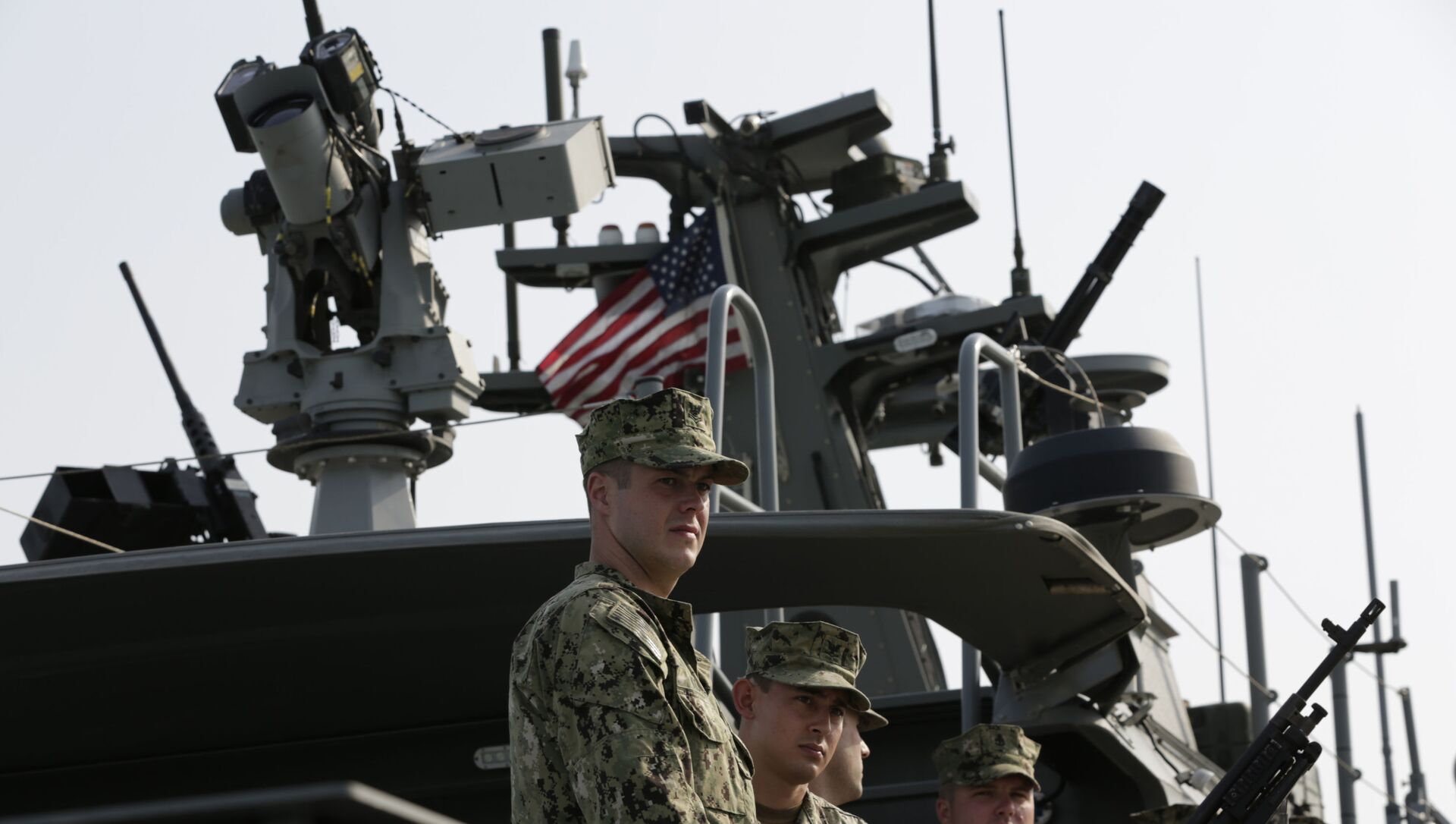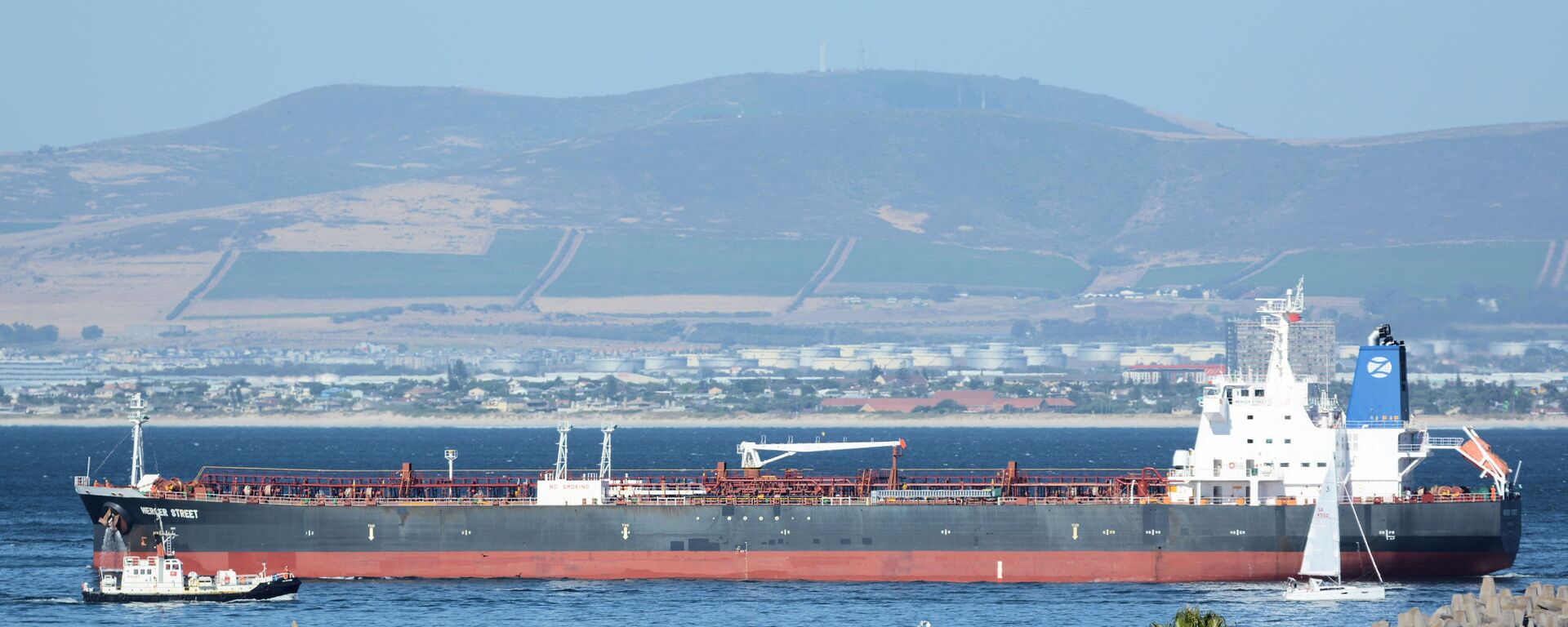US Reportedly ‘Moved Forces’ to Probe Suspected Tanker Seizure as Iran Warns of ‘Western Psywar’
10:42 GMT 04.08.2021 (Updated: 18:52 GMT 04.08.2021)

© AP Photo / Hasan Jamali
Subscribe
The past week has seen a dramatic escalation of tensions in strategic waters near Iran, starting with the 29 July attack on the Mercer Street oil tanker in the Gulf of Oman, and followed by reports Tuesday of a hijacking incident, and news that at least four commercial vessels had ‘temporarily lost steering ability’ in the same region.
The United States Navy deployed a warship from its massive naval base in Bahrain to ‘monitor the situation’ surrounding the suspected hijacking of a commercial vessel in the Gulf of Oman, a US official told the Financial Times on Wednesday.
The reported deployment followed reports by the UK Maritime Trade Operations (UKMTO) monitoring agency on Tuesday that a “potential hijack” had taken place about 60 miles (96.5 km) east of the Emirati city of Fujairah.
Maritime security sources told Reuters that “Iranian-backed forces” were responsible. Sources told the UK’s The Times that they were “working on the assumption” of “Iranian military or proxies” being involved.
UKMTO released an update of the situation on Wednesday morning, saying that the mysterious “boarders” had “left the vessel,” that the ship was safe and that the “incident” was “complete," but offered no further details.
WARNING 001/AUG/2021 Update 002
— United Kingdom Maritime Trade Operations (UKMTO) (@UK_MTO) August 4, 2021
Category: Incident – Potential Hijack – Non Piracy
Description: Boarders have left the vessel. Vessel is safe. Incident completehttps://t.co/toURu6jSzg#MaritimeSecurity #marsec pic.twitter.com/IvC44GOiic
UK and US officials remain tight-lipped about who was responsible for the suspected incident, and have not confirmed the ship’s identity. However, shipping industry publication Lloyd’s List has indicated that the vessel involved was an asphalt tanker called the Asphalt Princess, and that the ship, owned by UAE-based company Prime Tankers LLC, had been ordered to sail to Iran. However, other sources told media that the ship’s identity was not clear amid reports that at least four other commercial tankers were broadcasting a “not under command” status through their automatic identification system (AIS) transponders on Tuesday.
‘Western Psywar’
Iran called the hijacking reports, combined with the other recent shipping-related incidents, “suspicious,” denying any involvement and warning that the claims may be meant to ramp up hostilities and even provoke military aggression against the Islamic Republic by Israel and/or its allies.
Iranian Armed Forces spokesman Brig Gen. Abolfazl Shekarchi called the ‘hijacking reports’ a form of “psychological warfare” by the West.
“Contradictory news from some Western, Zionist [Israeli] and Saudi media about any maritime insecurity and hijacking of ships in regional waters is a kind of psychological warfare and setting the stage for new bouts of adventurism,” Shekarchi warned.
The spokesman stressed that “in addition to helping the safe movement of commercial ships,” Iran’s military has “full intelligence about any suspicious movements and stand completely prepared” for action, including to provide assistance to any foreign vessels requesting assistance.
Shekarchi’s comments were echoed by Iranian foreign ministry spokesman Saeed Khatibzadeh, who said Tuesday that certain actors were creating and spreading false stories meant to ‘create a vicious atmosphere’ to pursue certain ‘political goals.’
Tuesday’s ‘potential hijack’ incident came just days after the 29 July attack by unknown forces on the Mercer Street, an Israeli oligarch-managed, Japanese-owned, Liberian-flagged oil tanker making its way from Tanzania to the UAE. The Mercer Street attack claimed two lives, including its Romanian captain and a British bodyguard, with US and UK authorities saying they believed the attack was carried out by a drone.
The Iranian government forcefully denied any involvement, and threatened to respond “immediately and strongly” to any provocation.
Israel and its US and UK, Romanian, Canadian and NATO allies have formed a united front in blaming Iran for the incident, with US Secretary of State Antony Blinken warning Monday that there would be a “collective response” against Tehran. On Tuesday, Israeli Prime Minister Naftali Bennett warned that Tel Aviv does not rule out “acting alone,” adding that “Iran knows the price that we’ll exact when someone threatens our security.”
The Russian Foreign Ministry weighed in on the situation surrounding the Mercer Street on Monday, with a ministry spokesperson telling Sputnik that there was no indication of Iranian involvement in the suspected attack on the vessel, and that no evidence had been presented to that effect to the Russian side by any party.
The fresh round of Gulf insecurity echoes previous bouts of escalated tensions in the region amid a string of tanker seizures, mysterious attacks on commercial vessels, and the June 2019 shootdown of a US drone operating in Iranian airspace over the Strait of Hormuz. However, the latest tensions come at an unexpected time, with US negotiators continuing work to try to hammer out an agreement with Iran to restore the 2015 nuclear deal abandoned by the current administration. Israel, Washington’s closest regional ally, has sought to torpedo the nuclear deal for many years, and has lobbied the Biden administration not to return to it.
The latest mysterious ‘tanker seizure’ incident and the strike on the Mercer Street comes following a series of back-and-forth Iranian-Israeli claims accusing one another of attacks on one another’s commercial shipping. Last month, Israeli officials accused Iran of attacking the CSAV Dyndall container ship in the Indian Ocean. Before that, they blamed the Iranians for trying to sabotage the Hyperion Ray cargo vessel off the UAE coast in April, and the Lori container ship in the Gulf of Oman in March. In February, Tel Aviv charged Tehran with an attack on the Helios Ray cargo ship, also in the Gulf of Oman. Tehran has denied involvement in each instance, and in the case of the Helios Ray claims, accused the Israelis of a “false flag operation.”
In March, US and Israeli media reported that Israel quietly targeted at least a dozen Iranian tankers trying to deliver oil to fuel to energy-starved Syria over the past two years, causing “billions” in damage. Iran has not formally commented on these reports.



